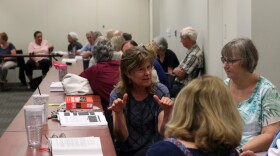The Mueller Report Community Discussion Series covered the middle section of Volume Two at its fifth meeting this past Sunday, July 14. The reading largely concerned possible obstructions of justice by President Trump.
In order to prove obstruction of justice, you need to prove three separate tenets. Moderator Shelby Steuart set up an example to illustrate each.
“In my example, I stole ice cream from Kroger and then I asked my friend, the only witness, not to testify,” Steuart said.
First, there must be an obstructive act, or an attempt to influence a court proceeding. In this case, it was Steuart asking her friend not to testify. Next, there must be a logical connection between the act and the proceeding.
“I know I’m going to have a hearing because I know I was caught breaking the law,” Steuart said. “I know my friend was the only one who saw it, so as long as she stays quiet, the prosecutor may not be able to convict me.”
Finally, the act must be intended to disrupt the proceeding.
“Even though I refuse to confess, the prosecutor knows from my text message with my friend that I’m trying to prevent her from testifying, and the investigator knows that if she doesn’t testify, I’ll likely get away with it,” Steuart said. “And there was no other logical reason for me to ask her not to testify.”
With that out of the way, participants discussed three cases in which the president might have obstructed justice: when he tried to remove the special counsel, when he tried to prevent disclosure of emails regarding the meeting between the Russians and senior campaign officials, and when he ordered White House Counsel Don McGahn to deny he tried to remove the special counsel.
In all three, the group felt a tension between what Trump might have done and how Mueller was allowed to report on it.
“We’re dealing with two related things — Trump trying to be the master of the narrative, and Mueller being constrained with having to put forth what might pass muster as proof in court,” said participant Helene Marotta.
Next week, the group will cover the end of the report, including Appendix C, which contains President Trump’s written responses.
The next meeting will be held at 3 p.m. on Sunday, July 21, at the Athens-Clarke County Library. Participants can join the series at any time and are strongly encouraged to read the scheduled section before attending.
For a complete schedule of the readings, visit WUGA’s Facebook page.



